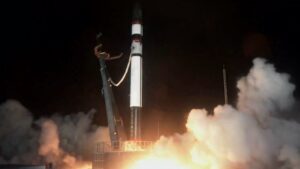Rocket Lab says engine issue caused Electron failure
By Jeff Foust

WASHINGTON — Rocket Lab said an Electron rocket failed to reach orbit May 15 when the vehicle’s computer system detected a problem with the second stage engine and shut it down.
In a May 17 statement, the company said it is continuing to review data from the launch, which suffered a malfunction of some kind around the time the second stage separated and ignited its single Rutherford engine. The engine shut down seconds later, resulting in the loss of the mission.
The company said initial reviews of the data “suggest an engine computer detected an issue shortly after stage 2 engine ignition, causing the computer to command a safe shutdown as it is designed to do.” The company added it had not seen that behavior before in testing of the engines, including a full-duration static fire of the stage.
“We are methodically working through the review process to address the issue,” Peter Beck, chief executive of Rocket Lab, said in the statement, adding that the company was “confident in a swift and reliable return to flight with minimal impact on our launch manifest this year.”
This was the second failure in less than a year for the Electron. The company determined a July 2020 launch failure was caused by an “anomalous electrical connection” in the second stage that, like this latest issue, evaded previous testing. The Electron returned to flight nearly two months after the failure on the first of six successful launches prior to this latest failure.
Rocket Lab also said that the failure and investigation would not affect its plans to merge with Vector Acquisition Corporation, a special purpose acquisition company (SPAC). Rocket Lab announced the merger March 1, with a goal of completing the merger in the second quarter of this year.
Rocket Lab said it and Vector confidentially filed an S-4 registration statement regarding the merger with the U.S. Securities and Exchange Commission May 4, and that they “continue to work towards the completion of the transaction.” The companies did not provide an updated schedule for completing the merger, however.
The customer of this launch, geospatial intelligence company BlackSky, is also in the process of merging with a SPAC, a deal it announced in February and said at the time it expected to close in July. Brian O’Toole, chief executive of BlackSky, downplayed the impact of the failure on the company in a May 15 statement. “BlackSky has additional satellites ready to deploy, as well as an active production line with more satellites on track to be delivered over the course of this year,” he said. “We will continue to execute on the expansion of our constellation and expect to remain on track to meet our business objectives.”
Ahead of the launch, Rocket Lab played up the mission as another step in its efforts to make the first stage of the Electron reusable. The company planned to recover the stage to test the effectiveness of enhancements made to the vehicle after a November 2020 launch and recovery.
Rocket Lab said that the first stage appeared to perform as expected and did not contribute to the failure. The stage splashed down under parachute and a recovery team placed it on a boat to return to the factory. The heat shield at the base of the first stage, upgraded for this launch, worked well, and the engines will later undergo hot-fire testing.
“Rocket Lab’s program to make Electron a reusable launch vehicle is advancing quickly and the company intends to conduct its third recovery mission later this year,” the company said in its statement, the same schedule it offered before the failure.
May 18, 2021 at 04:58PM
via SpaceNews read more...

Post a Comment